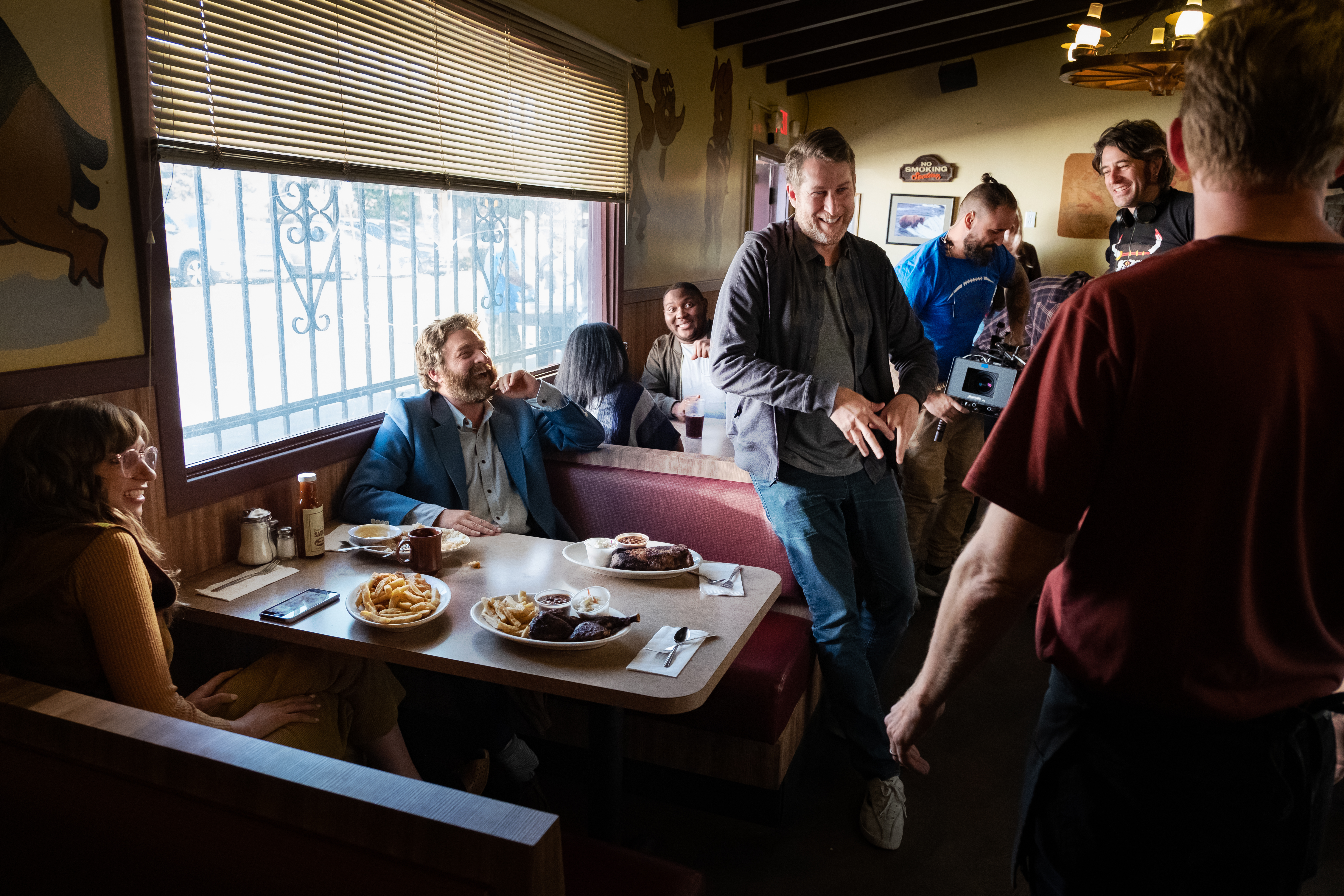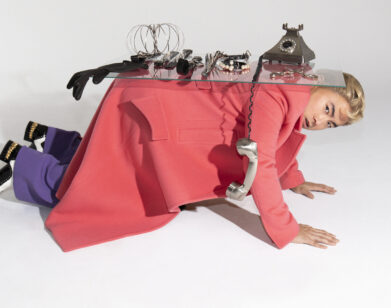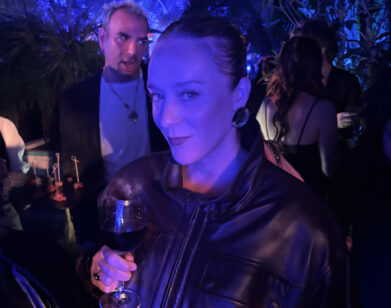Between Two Ferns: the Movie‘s Scott Aukerman Lets Zach Galifianakis Interview Him (Minus Ferns)

Behind the scenes of Between Two Ferns: the Movie. Courtesy Netflix.
Everyone knows what they’re getting themselves into when they sign up to be a guest on Between Two Ferns, Zach Galifianakis’s viral Funny or Die series. But no one can be truly prepared for the kind of absurd ignominy they are subject to sitting between said houseplants with the comedian, whose skill for skewering celebrities is unrivaled by the greatest of the grill masters. What started as a simple YouTube series is now a Netflix feature film, aptly titled Between Two Ferns: the Movie, written and directed by Scott Aukerman. The film follows Galifianakis’s Kerouac-esque road trip in his quest to compile enough Between Two Ferns episodes to convince a bolo tie-wearing Will Ferrell to give him a network TV show. Along the way, he roasts the likes of Paul Rudd, Jon Hamm, Benedict Cumberbatch, and Brie Larson (“named after a f-in piece of cheese”), sleeps with Chrissy Teigen, gets pepper-sprayed by John Legend, and spends some quality time with his beloved ferns.
As the host of the podcast-turned-TV series Comedy Bang! Bang!, Aukerman is new to feature filmmaking but no stranger to the fine art of question-and-answering. Guests on the show have included a vast array of real-life celebrities, and a vaster batch of not-so-real ones, including characters like Paul F. Tompkins’s Big Chunky Bubbles, a misanthrope who blows bubbles at children’s birthday parties out of hot soups. With Aukerman now a veteran writer, filmmaker, and interviewer, the real question is whether Galifianakis can manage to do the question-asking without insulting, alienating, and completely barraging the subject with his lack of self-awareness. Below is his attempt.
———
ZACH GALIFIANAKIS: Did we start already?
SARAH NECHAMKIN: Yeah, we can start.
SCOTT AUKERMAN: Oh, that was your first question?
GALIFIANAKIS: Yeah. “Have we started already?” is the first question.
AUKERMAN: Hm, that’s very philosophical in a macro sense. Have we started already? I don’t really know.
GALIFIANAKIS: Scott, what is your favorite color?
AUKERMAN: I had to pick a color for a new phone today, and I was kind of cycling through colors I’ve liked over the years when I was a child. It was perhaps purple. But now that I’m adult, I’ve put away such childish things. I have moved on maybe to a blue, but I settled on a green phone, so I don’t know, what does that tell you?
GALIFIANAKIS: Are you telling me that you think that a purple color is childish?
AUKERMAN: It’s a little childish, like the color of grape soda, which is a child’s drink.
GALIFIANAKIS: I wonder what Prince would have thought of that.
AUKERMAN: Oh no. I didn’t think about that. Am I canceled?
GALIFIANAKIS: Next question. What is the last book you read? These are warm-up questions.
AUKERMAN: Um, I suppose I could say something that made me sound really smart, so let me think about that. What is a smart book that people have read? Something by Ta-Nehisi Coates.
GALIFIANAKIS: That’s a good answer. Even I know that writer. Which one?
AUKERMAN: Oh shit, a follow-up. Um, his latest.
GALIFIANAKIS: Good answer. Next question.
AUKERMAN: By the way, you don’t have to continually say “next question.” I am pretty acclimated to the art of questions and answers.
GALIFIANAKIS: Maybe the reader’s not.
AUKERMAN: That’s a good point. I apologize.
GALIFIANAKIS: Here comes another question. The other night, we did a show together. You and I, at UCB theater with Doug Benson and Adam Scott. And I was listening to your story. Were you a photo double for Michael Caine?
AUKERMAN: Sort of. I was called in for an audition for the movie Austin Powers in Goldmember, and they told me I was there to play a young Michael Caine, who was—
GALIFIANAKIS: Scott, hold on one second. [Yelling away from the phone] Hey, let that person in.
AUKERMAN: Transcriber, please mark that Zach just yelled at someone, “Hey, let that person in.”
GALIFIANAKIS: Sorry, I’m getting the dishwasher fixed.
AUKERMAN: How can you fix the person you pay to wash your dishes?
GALIFIANAKIS: Well, it’s a machine.
NECHAMKIN: [Laughs.]
GALIFIANAKIS: Who’s laughing in the background?
NECHAMKIN: That’s me, Sarah from Interview.
GALIFIANAKIS: Oh, hey Sarah. You don’t have to fake laugh at Scott’s dumb answers.
AUKERMAN: Hey, you, wait a minute, she’s fake laughing at your dumb questions! Okay, so I was called in to audition for the movie Austin Powers in Goldmember, where I was to play Michael Caine’s younger self because Michael Caine in the movie, as I’m sure you know, Zach, as it’s in your top five, you were telling me earlier today…
GALIFIANAKIS: I don’t think I’ve seen it.
AUKERMAN: But it’s still in your top five. Interesting.
GALIFIANAKIS: Strangely, yes.
AUKERMAN: He plays Austin Powers’ father in the film, so I worked up a Michael Caine impression which is just kind of cockney and stuttering, you know like, [Impersonating Michael Caine], “I’m Michael Caine.” I did my scene and then I didn’t hear anything for maybe three months until I was told that I got the part, and Mike Myers and Jay Roach wanted to meet me. So I went down to a lot in Hollywood where they were rehearsing the movie.
GALIFIANAKIS: Hold on, hold on. I think I hear Sarah snoring.
NECHAMKIN: [Laughs.]
GALIFIANAKIS: Nope. Okay, sorry that was me. I mean, just cut to the chase. I have so many questions. Like, what’s your favorite shade? Okay, go ahead.
AUKERMAN: Okay, so I talked to Mike and Jay about comedy for like 25 minutes, and I thought, “Wow this is going really well, it’s very cool that they just want to meet anyone who’s in the cast and chat with them.” But after about 25 minutes, the small talk ended and they said, “Okay, now do us a favor and turn around. Turn your back to us.” I didn’t quite know what was happening. It’s one of those kinds of Weinstein #MeToo stories that you hear about. I turned around, and they said, “Perfect.” And then that was the end of the meeting, and I found out that they were going to use clips of an old Michael Caine movie, whenever Michael Caine was facing the camera, and then my body whenever he was turned away from the camera. So basically I’m in the movie with just my back to the camera all the time. That was my entrée into show business. I’m what’s known as a “backtor,” not a front actor.
GALIFIANAKIS: Did you get to know other Michael Caine back actors from other projects?
AUKERMAN: Yeah, it’s an exclusive club that I found myself gaining entry to.
GALIFIANAKIS: And when you do, do you turn your backs to each other?
AUKERMAN: Yes, and we rub backs.
GALIFIANAKIS: Okay, that’s what I thought. That’s what I’ve always heard. I heard it right. Okay, next question.
AUKERMAN: We’re really putting the “interview” into Interview magazine.
GALIFIANAKIS: If you could have any meal in any place—it can be Thai food in Mexico, it doesn’t have to coincide with the place.
AUKERMAN: And it can be the best version of it, even though there probably is not great Thai food in Mexico?
GALIFIANAKIS: Yes. Where would you like to have it? And by the way, this would be your last meal.
AUKERMAN: Who’s killing me? How am I dying?
GALIFIANAKIS: This is death row.

Galifianakis, with ferns. Courtesy Netflix.
AUKERMAN: So I’m let out of death row to get this meal wherever I want to go?
GALIFIANAKIS: Right.
AUKERMAN: What did I do to get onto death row?
GALIFIANAKIS: You really want to know? It’s a gigantic tax scam.
AUKERMAN: And they’re giving me the chair? For taxes?
GALIFIANAKIS: Mmhmm. This is in the future like eight years, when the rule of law gets really strict.
AUKERMAN: With President Pence?
GALIFIANAKIS: Oh, fingers crossed. With Vice President Bobby Jindal.
AUKERMAN: I’d probably have some sort of really good hamburger, maybe an In-N-Out 4×4.
GALIFIANAKIS: What? Are you serious? That’s what you’re going to have?
AUKERMAN: Well, I wouldn’t have to pay the consequences with my intestinal system the next day.
GALIFIANAKIS: The answer to your question makes me not want to have a follow-up. So I’m not going to follow up anything.
AUKERMAN: But I would have it at your house. What’s your address again?
GALIFIANAKIS: 1600 Pennsylvania.
AUKERMAN: Avenue? I think. “An address that changes all the rules,” as Wesley Snipes once said.
GALIFIANAKIS: Would you rather have 16 belly buttons or six-inch earlobes? And you can’t do anything about it, you just have to live with it. Six-inch earlobes, and the belly buttons, you don’t really know where they may end up.
AUKERMAN: I assume this is some kind of a wish that I’m making on a Zoltar machine?
GALIFIANAKIS: No, you’ve been cursed. It’s a punishment for your tax evasion.
AUKERMAN: As if dying isn’t bad enough.
GALIFIANAKIS: Well, before your hanging, we’re going to give you these things, where you have to walk around with them. And then they walk you around town for two weeks nude.
AUKERMAN: Nude?
GALIFIANAKIS: Yeah, because they’ve got to see all the belly buttons. If you stick to the earlobes, then you could be clothed.
AUKERMAN: I’ll pick the earlobes then.
GALIFIANAKIS: Great answer, great answer. What is one word you—
AUKERMAN: You didn’t say “next question.”
GALIFIANAKIS: Next question.
AUKERMAN: Are these off the top of your head?
GALIFIANAKIS: No, I wrote down some of them. I wrote down “What is your favorite color?”
AUKERMAN: Wow.
GALIFIANAKIS: Next question. Ready? Between Two Ferns: The Movie—what was your biggest pain in the butt about directing it?
AUKERMAN: Well, I came in not ever having directed a movie. I directed a few TV things, so I didn’t have a lot of experience. I was a little nervous about that, and the fact that it’s an improvised movie certainly led to some trepidation on my part, even though I felt kind of uniquely positioned to do it at this point in my career. We shot it like a documentary. Celebrities would just kind of sign up for it as we went.
GALIFIANAKIS: Was Jack [Black] your first choice to play me? I had read somewhere it was Josh Gad.
AUKERMAN: Well, it was Josh Gad for a minute, but Jack Black is, as I say, the thinking man’s Zach Galifianakis.
GALIFIANAKIS: Andy Kindler calls me the thinking man’s Pauly Shore. It’s safe to assume that the lead character, me, was, uh, easy to work with.
AUKERMAN: I loved the character. When we would say action, that guy was a pleasure.
GALIFIANAKIS: I hear the real Zach is actually very dead inside. Will you be having a Christmas party this year?
AUKERMAN: Okay, so this is very controversial, but my wife and I usually have a Christmas party, and we did not have one last year. And I implored her, “Hey we should put out an e-vite to let everyone who’s usually invited know that we’re not having a party, because everyone is going to assume that they’re not invited this year.” And she scoffed at me, saying that was stupid, and then I saw Natasha Leggero the other day, and I brought up that we skipped the holiday party, and she was so relieved she said, “Oh thank God, I thought that I wasn’t invited this year.” So, I want to put it out publicly that we did not have one in 2018, but I believe it’ll be back up on its feet in 2019. Will you come?
GALIFIANAKIS: Uh, I don’t know if I’ll be around this holiday season.
AUKERMAN: Really? Like, on earth?
GALIFIANAKIS: It might be my time to leave.
[Pause.]
Um, okay. My next question is this, are you ready for it? I know you were a big fan of the me… I, eh, uh, uh, ah, with television. Do you dream of—
AUKERMAN: Of what? Television in general?
GALIFIANAKIS: Of storytelling, if you will.
AUKERMAN: Sure, we’re all storytellers, aren’t we? When I grew up, I didn’t want to be a TV star, or a movie star, I wanted to be a storyteller because that doesn’t sound infantile at all.
GALIFIANAKIS: If you step back from it, that’s what we all are, storytellers.
AUKERMAN: Hm. Interesting point, I’d never considered that. Go on.
GALIFIANAKIS: Will the transcriber need a sarcastic font for that? What story would you like to tell given full freedom?
AUKERMAN: I don’t think my personal story, what’s actually happened in my life, is that interesting to anyone, but I think the feelings we all go through that are universal to the human experience are stories that I’m probably interested in delving into. I think that we all become a little more attuned to the effects that our words have on other people. I think Between Two Ferns and my history with shows like Mr. Show [with Bob and David], we embraced button-pushing and trying to find where the line is, and the line continually moves, which is a great thing. I think as long as it has some sort of attempt at artistry in it, it can be good to kind of try to go up to that line or even cross the line, and try to figure out where it is.
That said, when I was working on Mr. Show, we had a rule that if we came up with a sketch, regardless of if it was just silly or button-pushing, we had to sort of elucidate exactly what we were trying to say with it. If we couldn’t back up our point of view and why we were writing the sketch, then it would not get on the air. That’s something that I’ve tried to keep in my work since then—even if we’re just being silly and having a fun time, we want to be able to get across our point of view and what we’re trying to say. Did I just sound like a professor?
GALIFIANAKIS: Um, yeah. A professor of boredom.
AUKERMAN: Hm.
GALIFIANAKIS: No, that was actually a really good answer. Humor goes through phases, and it’s in a tricky phase now. The one thing that bothers me is when you see movies in the future, like Gattaca or Blade Runner, nobody has a sense of humor. It’s almost like we’ve been told not to rub anybody. I feel like whatever PC-ness, whatever you want to call that, I wonder if that gets to a point where it’s like we cannot make fun of each other.
AUKERMAN: I think dystopian future movies are more saying that life is going to get so hard for people that nothing will be funny, but that’s never been true. During the terrible times of the Great Depression, there were great works of meaningful art that came out of it, like The Grapes of Wrath. Comedy was huge back then. Comedy is an escape from things getting so difficult.
GALIFIANAKIS: It is the best tool and the most underutilized tool, and also the red-headed stepchild of problem-solving. For those who know how to use it well, it is very therapeutic on many levels.
AUKERMAN: By the way, you’re not allowed to say red-headed stepchild anymore, so you’re canceled.
GALIFIANAKIS: I know, that’s an old Southern expression I heard years ago. I still love it. No offense to stepchildren and redheads.
AUKERMAN: I think it’s more the redhead part. Stepchildren are very big right now, especially in corners of the internet that I certainly don’t explore.
GALIFIANAKIS: I have many redheads in my family. I was a redhead.
AUKERMAN: You were a cute little baby. I’ve seen pictures.
GALIFIANAKIS: Oh, Scott. This isn’t about me. What kind of toothpaste do you use?
AUKERMAN: I don’t have a consistent brand, I literally am someone who just goes and buys the first thing I see, as long as it’s not Tom’s of Maine.
GALIFIANAKIS: You don’t like Tom’s of Maine? They make a good condom.
AUKERMAN: No. I had a roommate who used Tom’s of Maine and I would say that, across the board, it wasn’t as effective as it should have been. This turned from a question that could have been a great advertisement for whatever toothpaste maker is out there that I do use, into a slam on Tom’s of Maine that was unintended on my part.
GALIFIANAKIS: Do you have a favorite day of the week?
AUKERMAN: I love Mondays.
GALIFIANAKIS: You’re the opposite of Garfield.
AUKERMAN: Yeah. Not a cat, not orange, love Mondays, hate lasagna, live with a guy named Don, not John. I love Mondays because it’s like, man, all the fun’s about to start. I get five great days of work ahead of me.
GALIFIANAKIS: Let’s close this out with some more questions. Do you often think about another profession and what would that be, if you weren’t doing the show business thing?
AUKERMAN: I sometimes think that it would be fun to be a lawyer because I find a lot of what I do in my podcast, Comedy Bang! Bang!, is what I call comedy lawyering, where I’m sitting there cross-examining the other person to try to lead to something funny. I know a lot of being a lawyer isn’t like that, it’s just a lot of court appearances where you’re scheduling arraignments and stuff like that, but maybe an old Southern country lawyer that’s, like, fanning himself with a newspaper in a hot courtroom.
GALIFIANAKIS: “I declare it’s hot in here, but let me tell you something about the defendant.” That kind of guy?
AUKERMAN: Yeah, exactly. Maybe wearing a straw boater in court. And takes it off respectfully when the judge enters.
GALIFIANAKIS: There is a performance element to being a lawyer.
AUKERMAN: You’re on the world’s greatest stage and the stakes are actually higher than what we do because a man’s life is at stake because he’s been wrongfully accused, and being railroaded by the system.
GALIFIANAKIS: Jesus, who knew this is what I was going to uncover? Such a passion for the law. When you’re an older man in your 80s, do you think you’ll keep up with show business, or is it for much younger people? We have years of plastic surgery and the changes in your face to look forward to.
AUKERMAN: Well, I’ll already be on a ton of steroids to get my body in the condition that it’s in currently. But when a man enters his 30s as I’m about to do, things start to droop, and you need a tuck here, an erasure of lines there. The great thing about plastic surgery is anytime you see someone with plastic surgery, like Paul McCartney, you just think, “Look at how young that person looks.”
GALIFIANAKIS: I did not know that he had ever had any surgery.
AUKERMAN: That’s because he still looks like he’s 20 years old. Plastic surgery, it just makes a person look not like a melting weird version of an old person, it makes them look exactly like a young person.
GALIFIANAKIS: I don’t get any work done, but I do have a high-powered sander. My dermatologist sands my face with one that you would use to take old paint off a wall.
AUKERMAN: Just stripping away?
GALIFIANAKIS: Yes.
AUKERMAN: That’s okay, that’s still natural.
GALIFIANAKIS: When she does that, it cuts off the circulation. I bleed out for like… it takes about three and a half weeks to heal.
AUKERMAN: Well, I think you have a real future in interviewing, presuming you master the art of the dismount, which should be happening any second now.
GALIFIANAKIS: This is my dismount. Sarah, how good was this interview on a one to ten basis? Ten being high and one being pretty good, too.
NECHAMKIN: If one is pretty good, then I’ll give it a one.
GALIFIANAKIS: Jesus, what a jerk. Okay.
AUKERMAN: Please include that in the interview.






